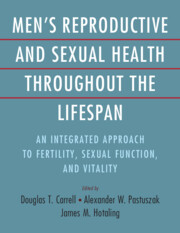 Men's Reproductive and Sexual Health Throughout the Lifespan
Men's Reproductive and Sexual Health Throughout the Lifespan from Section 2 - The Biology of Male Reproduction and Infertility
Published online by Cambridge University Press: 06 December 2023
For many years sperm epigenetics has been a focus of studies hoping to identify novel mechanisms that drive infertility and offspring health abnormalities. This effort has yielded many exciting prospects but to date no direct and firm mechanistic pathways have been fully elucidated. This is largely a result of the unique nature of the mature sperm that is reflected in the distinct epigenetic signatures that are found therein. This unique landscape makes traditional approaches for understanding mechanisms difficult. However, the utility of sperm epigenetic marks in the prediction of specific reproductive outcomes is becoming clearer. While the mechanisms that explain the biological underpinnings of some of the associations between sperm epigenetics and reproductive health have yet to be elucidated, the value that these marks offer in prediction of various reproductive outcomes is becoming clearer.
To save this book to your Kindle, first ensure [email protected] is added to your Approved Personal Document E-mail List under your Personal Document Settings on the Manage Your Content and Devices page of your Amazon account. Then enter the ‘name’ part of your Kindle email address below. Find out more about saving to your Kindle.
Note you can select to save to either the @free.kindle.com or @kindle.com variations. ‘@free.kindle.com’ emails are free but can only be saved to your device when it is connected to wi-fi. ‘@kindle.com’ emails can be delivered even when you are not connected to wi-fi, but note that service fees apply.
Find out more about the Kindle Personal Document Service.
To save content items to your account, please confirm that you agree to abide by our usage policies. If this is the first time you use this feature, you will be asked to authorise Cambridge Core to connect with your account. Find out more about saving content to Dropbox.
To save content items to your account, please confirm that you agree to abide by our usage policies. If this is the first time you use this feature, you will be asked to authorise Cambridge Core to connect with your account. Find out more about saving content to Google Drive.